Police Self-Investigators are Doorstepping Spycop Victims
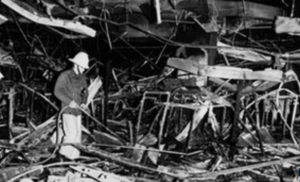
Debenham’s Luton branch, July 1987
Once again, police self-investigations have been contacting activists who were spied on, asking for co-operation.
The latest activity centres around Operation Sparkler/Operation Nitrogen, which is examining evidence that undercover police officer Bob Lambert planted incendiary devices in the Harrow branch of Debenham’s in 1987.
Lambert was one of a group of three animal rights activists who were intent on damaging the stores in protest at their sale of fur. The branches were simultaneously attacked. Two of the activists, Geoff Shepherd and Andrew Clarke, were jailed. Lambert has been named as the third person. It is a charge he strenuously denies.
But if it wasn’t Lambert, who was it? Three people planted devices, so either there was a fourth person in the group whose existence has never been mentioned and who Lambert allowed to get away, or else Lambert is lying and he did it. There appears to be no third option.
Either way, it’s clear that Lambert’s evidence was withheld from the court at the original trial, which means Shepherd and Clarke’s convictions are unsafe in the same way that fifty now-quashed convictions of other spied-upon activists were.
MET FORCED TO INVESTIGATE THEMSELVES
Faced with such strong evidence against Lambert, in April 2016 the Met reopened their investigation.
In January last year it was revealed that over £250,000 had already been spent, nobody had been interviewed under caution, and Met lawyers thought the report would be finished in July 2017. We’re still waiting.
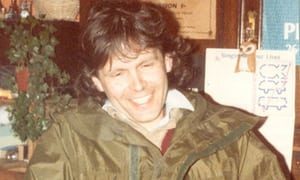
Bob Lambert whilst undercover
Officers have been travelling the country talking to people they think were around Lambert at the time.
Lambert’s unit, the Special Demonstration Squad, was praised by the highest ranks in the Met. When he was undercover, and later when he ran the SDS, Lambert was a hero to other spycops. He had Clarke and Shepherd sent down, but now they are appealing their convictions.
For the Met, defending their targeting of the other two, to be investigating Lambert at the same time is a conflict of interest – if he is to blame then the convictions of the other two must be overturned.
To send police officers to investigate other officers is ludicrously biased. They are marking their friend’s homework. Anything incriminating Lambert may be twisted or suppressed to help shore up the crumbling case against Clarke and Shepherd.
WE CAN’T TRUST THE LIARS
We got the public inquiry, flawed and biased towards the police as even that is, because we didn’t settle for the various self-investigations by police and their satellite bodies such as the Independent Police Complaints Commission and HM Inspectorate of Constabulary.
Our distrust has been vindicated by the buckets of whitewash delivered by these projects. The Met’s dedicated and overpriced investigation into spycops, Operation Herne, made claim after claim that was discredited as soon as it was uttered.
They originally said there was only evidence of one officer stealing a dead child’s identity; now we know half the officers did it and it was mandatory for decades. They released a report saying there was no evidence of spying on Stephen Lawrence’s family on the same day that Mark Ellison QC’s report was published which showed there was.
After more than seven years of victims giving the appalling detail of the deceit and abuse they’ve suffered, and the harsh, enduring personal damage that it has caused, it takes some gall for Met officers to expect to be respectfully taken as independent arbiters.
They have as little regard for the welfare of the victims as the officers who did the spying. One of those visited told us:
‘The first time was seven months ago a man and a woman came round, the second time was two men about three or four months ago.
‘They were trying to get me to say if I knew anyone who was active in that era or did I know anyone, almost did I do anything myself in that respect. They wanted me to make a statement about it, but of course I didn’t. I was active in the 80s and I was convicted of things. I knew a lot of people who were around at the time through SLAM and through London Greenpeace.
‘Then they gave my number and details to this other one, Operation Herne. Both times they came round my house uninvited, harassing me, trying to get me to make some statement, which I refused. The second ones said they were doing an investigation into undercover police officers, which I said was a joke, because how can police officers investigate themselves?
‘I said if I got any more harassment from them I might take legal action against them, either individually or collectively. I said I wasn’t happy with people just turning up on my doorstep, I found it very disturbing.
‘They’re the lowest of the low, these people. It makes me feel ill to think I was in touch with one of them.’
Brandon Spivey was visited out of the blue, in a place that he doesn’t often visit, which he found unsettling in itself. Once faced with the officers, he let them know what he thought of them.
That fact they had travelled 200 miles from London made it clear this was an irregular situation, more about intimidation.
‘The coppers must have known I was going to be there, which was a bit of a shock. It wasn’t my regular address. I spend a lot of time out of the country. I flew in Sunday night, I saw my mum Monday morning and went for a drive with her, and that’s where the coppers had come to ‘doorstep me’. There was no prior warning at all.
‘It was plain clothes officers, the two who’d been visiting everybody else, apparently. They were nervous. I fronted them out, asking them both their names and to see their identification, which I wrote down in front of them . I made them stand in my mum’s shop, so there’s about half a dozen people on my side looking at them. They said “do you want to speak of this outside?” I said if you want, so we stood outside in the street.
‘They only presented me with the letter when we were stood outside. They made no attempt to explain anything, no “I’m sorry this might be a bit of a shock but…”. It was plain and simple, really quite hostile, them trying to be intimidating. The letter they gave me said it was Operation Sparkler.
‘They said “we want to ask you about something that happened thirty years ago. Do you know anything about incendiary devices at Debenham’s?” I said yeah, I know all about it.
‘They said “can you give us some names?” I said yes, I’ll give you some names; John Dines and Bob Lambert.
‘I said, “I know why you’re here, you know why you’re here, now do me a favour and fuck off”. The two of them walked off in opposite directions, they were so flustered and made no attempt to even reply to my very clear attitude towards them and their bogus visit.’
Others have had advance warning, even if they didn’t know why, as another person told us.
‘They wrote to me in May at my current home address, a letter from Operation Sparkler/Nitrogen saying they believed I might have information about the ALF and people involved in the 1987 Debenham’s attacks, that could help them identify other perpetrators.
‘I was completely mystified. I’ve had no contact with the ALF or animal rights movements at all. I was involved in anarchist circles from 1979 to 1986, and I knew Dave Morris and people through London Workers’ Group. But by 1987 I was politically inactive. Probably the last time I was arrested was at Wapping [strike Jan 1986-Feb 1987], I was cautioned – it wasn’t even a formal caution, they just told me to bugger off.
‘I called them and said I have no idea why you think I might be able to help you, I don’t know anything about it. They said they would like to talk to me anyway and asked where I would like to meet. I said Bethnal Green police station. They said “I don’t want to talk to you in a police station, can’t we have a coffee somewhere?” I wasn’t having that.
‘I googled the Debenham’s attacks, followed my nose to the Undercover Policing Inquiry and, having seen a list of core participants and who was representing them, phoned Mike Schwarz at Bindmans for advice. He said “that’s a coincidence because I was just about to ring you”.
‘Weirdly, he couldn’t tell me why, because it was in connection with a document that he was not able to share – or even describe – because of a confidentiality commitment. However, the inference is that my name is on some kind of list.
‘My hunch is that somewhere along the line some lazy underemployed police spy decided to invent a bunch of shit and plucked my name out of an old spycop file, to fill in a gap in their story.’
It seems to be common for political police to think every group is as hierarchical as the police. If they can’t see a group’s command structure with officers, platoon leaders, quartermasters and whatnot then they presume it must be hidden. Then they start superimposing it on unstructured organisations or groups of people who are just friends.
Undercover officer Mark Kennedy took a key role in Climate Camp and was in the extended two-day meetings every month with details worked out by protracted consensus decision making processes, yet still his bosses gave him a shortlist of imagined commanders to keep tabs on.
LYING ABOUT US, LYING ABOUT THEMSELVES
It raises questions about who has been spied on, and what incorrect information is till on our files. It also has wider implications. The spycops’ files about our activities and any supposed danger we pose is being used to decide whether it’s safe to release the names of those same officers who spied on us.
Helen Steel, who was spied on by Lambert and deceived into a two-year relationship by John Dines, told a preliminary hearing of the public inquiry in November 2017 that not only were her files inaccurate – listing her as involved in campaigns she left twenty years ago- but nothing the spycops say can be taken at face value:
‘I think it is important that you know that from my perspective and the perspective of many of the women, we have seen the lies that these undercover officers are capable of, and just how convincing they are. They are professional liars. And I think that it is really important to bear that in mind when taking into account statements that they may make to you in letters or things that they may say to psychiatrists.’
Alison, who was deceived into a relationship by Mark Jenner, has described how officers from the Met’s Department of Professional Standards met up with her and asked for personal photos and home videos, yet wouldn’t even admit that Jenner was a police officer.
Even now, five years since Jenner’s cover name, real name, photo and profile were made public, and two years since they apologised to Alison, there has still been no official confirmation that he was a police officer.
That is not impartial. It is protecting one side whilst exposing the other. It is also failing to see this as a perpetrator/victim situation. The Operation Sparkler/Nitrogen doorsteppings are more of the same.
The swathe of earlier reports are proof, if it were needed, that police self-investigations must not be trusted. Their persistence and intrusion shows that they do not acknowledge their wrongdoing, nor respect the citizens they abused.
COPS is one of several groups who will be publishing a joint statement warning of these visits, advising those affected not to interact with these agents of our abusers.

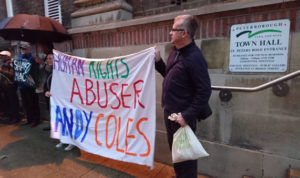
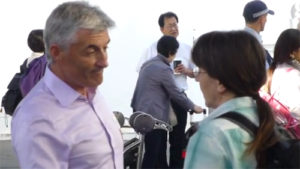
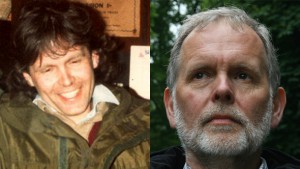
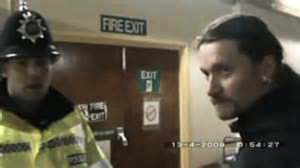

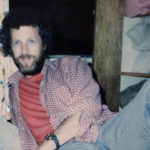

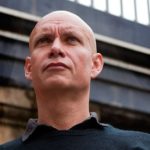
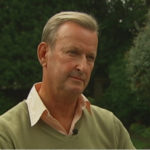

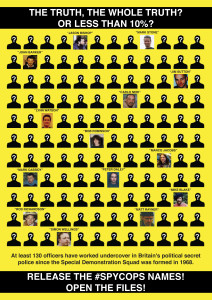
 Guest blogger Harvey Duke with the view from Scotland:
Guest blogger Harvey Duke with the view from Scotland: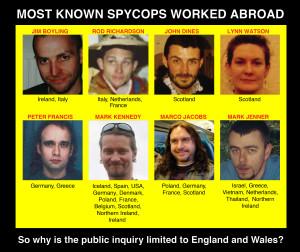 The German government have formally asked to be included in the forthcoming
The German government have formally asked to be included in the forthcoming 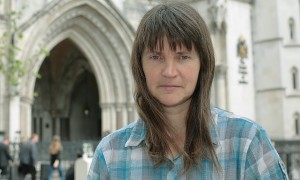
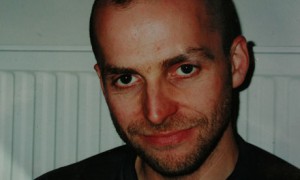
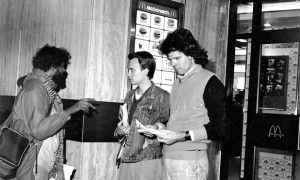
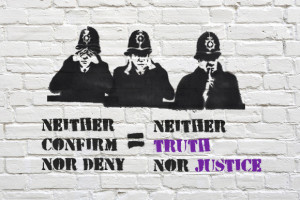 I submit that they were perfectly happy to reveal their methods and the groups that they were spying on when it suited them for PR purposes and that the reason they want to bring in “Neither Confirm Nor Deny” is that actually just to cover up serious human rights abuses.
I submit that they were perfectly happy to reveal their methods and the groups that they were spying on when it suited them for PR purposes and that the reason they want to bring in “Neither Confirm Nor Deny” is that actually just to cover up serious human rights abuses.